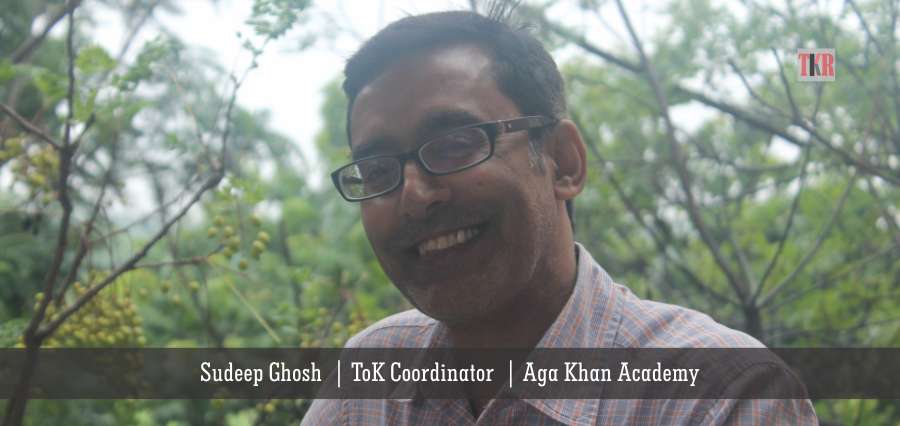To pursue knowledge
is like being a wheel that continues to turn
even though the cart stopped
long ago
~ Tao Te Ching
Indian education has marooned its learner in the wasteland of flawed strategy and myopic vision. Experiments with the models of education (CBSE, ICS, State boards) in India have not been designed to yield promising results until international education stepped in to reorient rote-learning towards an unfolding of enquiry-based learning of abiding import where the learner (read knower) discovered a personalised space to internalise knowledge and breathe life into the moribund sense of belonging. No wonder, Indian education witnessed a paradigm shift: the congenital defects which permeated pedagogical theories were debarred, the hegemonic guru (teacher)-shisya (taught) power structure was dismantled and a bond of reciprocal learning was forged anew. Close-ended curricula transitioned into dynamic, independent, student-centric curricula where the knower is radically singular and is redeemed by perceptivity of thought and novelty of methods. International education, courtesy International Baccalaureate (IB), crafted a pedagogy of possibilities for knowers to discover their inner worth, map out the sprawling canvas of knowledge and bask in the enduring resonance of cognitive splendour. It ushered in the concept of ‘relevance gap’, to borrow the words of Professor David Perkins, to make learning more accountable, practical and useful. Due to space constraints, I will confine my attention to IB’s ‘core’, the triangle of IB consciousness where the mind, the body and the soul are seamlessly blended through ToK, EE and CAS.
Theory of Knowledge (ToK), a course on metacognition, is an epistemological delight to take cognitive leaps. It synthesizes enigma and clarity in building a ladder of abstraction. It stretches knowers by being inter-disciplinary, which was never the modus operandi of the Indian system, to unravel the nature of truth. In analysing what is biased, unethical, manipulated, unreal and controversial, the central paradox in the acquisition of knowledge is evaluated by grappling with real life situations – local, national and global.
If Alishah can argue with discerning clarity how the motif of inclusivity in the poetry of Danez Smith and Kahlil Gibran intersect cultural disjunction and spiritual conjunction to foreground ideological robustness; if Aurodeep finds the ekphrastic poems of Shanta Acharya a meditation on the antithesis of impermanence; if Preksha contends that the rhetoric of logos and pathos in Tracy K Smith’s Ordinary Light (2018) creates a duality between authority and commonality by navigating strands of intimacy and extimacy in their individual Extended Essay (EE); I know where the refinement of deconstruction, the rigour of inferential thinking, the validity of noesis and the doggedness of self-confidence without an iota of intellectual hubris and these other dazzling array of probing to other academic disciplines come from. All testify to critical thinking and international-mindedness of an international curriculum. By the way, EE is a 4000-word research paper, the quality of which can be equated with any post-graduate dissertation.
Empathy is dwindling; the home and the world are falling apart. Through CAS (Creativity, Activity & Service), the quality of life, attitude and disposition is assured. It is an appeal and commitment to nurturing a humanistic and pluralistic ethos. I am tempted to recall the timeless receptivity of Ruskin Bond’s puckish yet prophetic lines: ‘If a tortoise could run/ And losses be won, /And bullies be buttered on toast;/ If a song brought a shower, / And a gun grew a flower, /This world would be nicer than most!’ Let the arrogance of ignorance be tickled to humility through education which pricks action from a capitalised SELF to a diminutive self in the lower case. Knowers serve the community of the deprived with the joy and value of selflessness, throwing off the shackles of self-seeking.
What does the future look like? Be it Arnold Toynbee’s scepticism in A Study of History about the nature of pervasive violence or Steven Pinker’s overt optimism about peace in Enlightenment Now, the malady of bias has multiplied past measure. As I write this, the recent crackdown on radical intelligentsia in India where they are hounded and slapped with sedition charges, the three-month ‘Adarsh Bahu‘ course in an Indian university to ‘empower’(?) women, and the mushrooming of ‘so-called’ international schools where mercenary instincts reign supreme are stark examples of intolerance, authoritarianism, regimentation, manipulation, jingoism and consumerism. The latitude of thinking is shrinking, shrinking to subvert mindfulness, shrinking to gag lateral thinking, shrinking to subject fearless thinkers to polemical target and convert them to docile prisoners of Plato’s cave. International education is the only panacea. The future of 21st century Indian education hinges on the republic and autonomy of thought by embracing intellectual dissent and stimulating an eternal craving for knowledge, which international education espouses and practices. Let the robustness of its education be kept aflame with Tennysonian zeal against the howling gales of post-truth: To strive, to seek, to find, and not to yield!
Paradoxically, the sinking cargo of Indian education, which could have stayed afloat by imbibing the timeless insights envisaged by the visionaries like Tagore, Sri Aurobindo and Jiddu Krishnamurti, has to seek a Western model for survival and relevance. It is also ironic that with the advent of international education, the receding clarion call of Tagore is now more pronounced to the unfathomed minds: ‘Come out of your present limitations. You are to attain the impossible, you are immortal.’
Sudeep Ghosh is ToK Coordinator and faculty in the English department at the Aga Khan Academy, Hyderabad(India). His pedagogical articles, poems, research papers, translations and art criticisms have appeared in national and international journals. Aesthetica Magazine (UK), Le Dame Art Gallery (UK), The Canadian Literature (University of British Columbia, Canada), Wasafiri (Open University, London), Teacher Plus (India), The Indian Literature(Sahitya Akademy, India), Penguin (India), to name a few.









